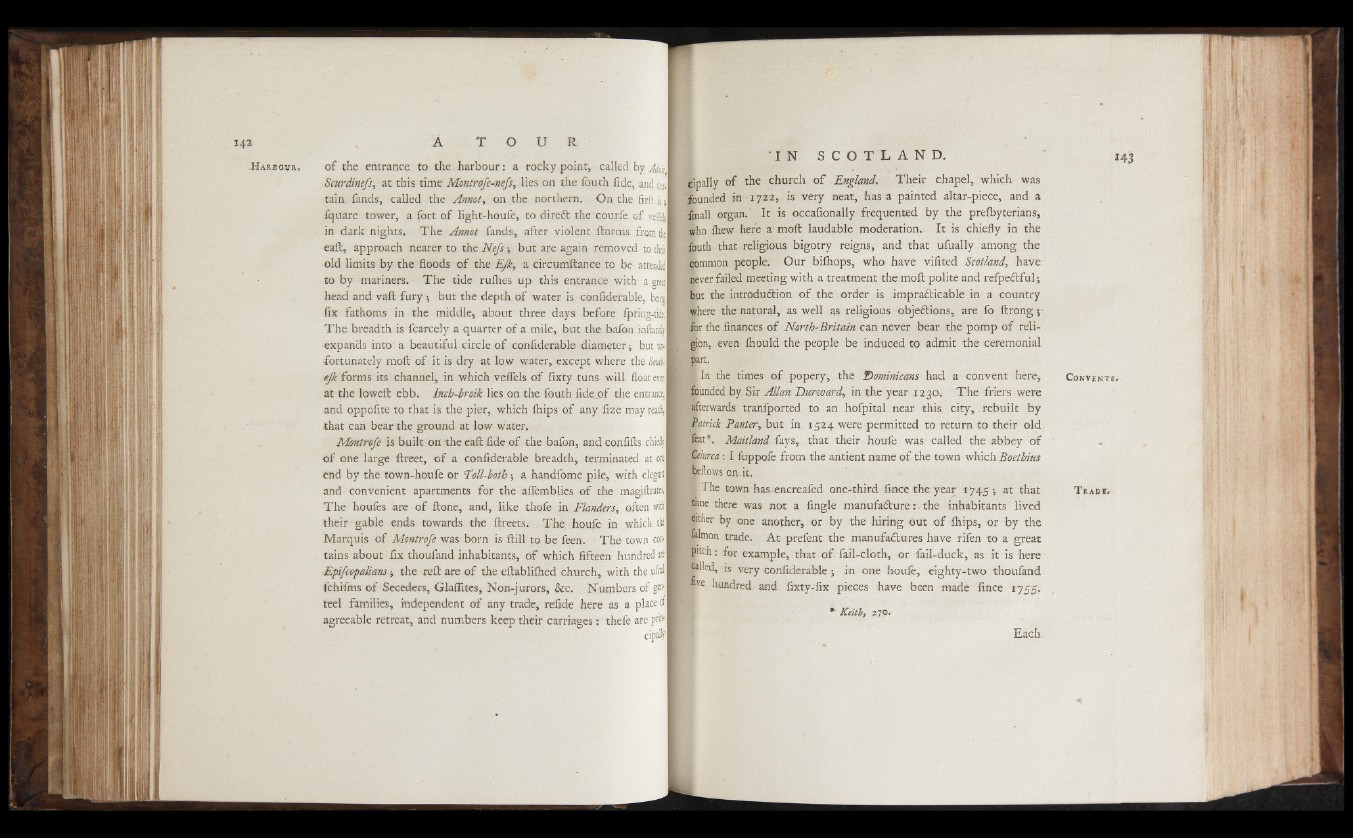
H a r b o u r . of the entrance to the harbour: a rocky point, called by
Scurdinefs, at this time Montrofe-nefs, lies on the fouth fide, and certain
fands, called the Annot, on the northern. On the firft is a
fquare tower, a fort of light-houfe, to dire ft the courfe of veiitls
in dark nights. The Annot fands, after violent ftorms from the
eaft, approach nearer to the Nefs; but are again removed to their
old limits by the floods of the E/k, a circumftance to be attended
to by mariners. The tide rulhes up this entrance with a great
head and vaft fury 5 but the depth of water is confiderable, being
fix fathoms in the middle, about three days before fpring-tide,
The breadth is fcarcely a quarter of a mile, but the bafon inftantlr
expands into a beautiful circle of confiderable diameter; but 1®
■fortunately molt of it is dry at low water, except where the Sault-
ejk forms its channel, in which vefiels of fixty tuns will float era
at the loweft ebb. Incb-broik lies on the fouth fide of the entrance,
and oppofite to that is the pier, which Ihips of any fize may read,
that can bear the ground at low water.
Montrofe is built on the eaft fide of the bafon, and confifts chiefly
of one large ftreet, of a confiderable breadth, terminated at on
end by the town-houfe or Toll-loth; a handfome pile, with elegant
and convenient apartments for the allemblies of the magiftrata
The houfes are of ftone, and, like thofe in Flanders, often wii
their ~ gable ends towards the ftreets. The houfe in which tk
Marquis of Montrofe was born is ftill to be feen. The town contains
about fix thoufand inhabitants, of which fifteen hundred art
Epifcopalians; the reft are of the eftablilhed church, with the ufi»
fchifms of Seceders, Glaffites, Non-jurors, &c. Numbers of g®
teel families, independent of any trade, refide here as a placei
agreeable retreat, and numbers keep their carriages: thefe are pr®
eipally of the church of England. Their chapel, which was
founded in 1722, is very neat, has a painted altar-piece, and a
fmall organ. It is occafionally frequented by the prefbyterians,,
who Ihew here a moft laudable moderation. It is chiefly in the
fouth that religious bigotry reigns, and that ufually among the
common people. Our bifhops, who have vifited Scotland, have
never failed meeting with a treatment the moft polite and refpeftful;
but the introduftion of the order is imprafticable in a country
where the natural, as well as religious objeftions, are fo ftrong;
for the finances of North-Britain can never bear the pomp of religion,
even ihould the people be induced to admit the ceremonial
{art.
3 In the times of popery, the Dominicans had a convent here,
founded by Sir Allan Durward, in the year 1230. The friers were
afterwards tranfported to an hofpital near this city, rebuilt by
Patrick Banter, but in 1524 were permitted to return to their old
feat*. Maitland fays, that their houfe was called the abbey of
Celurca : I fuppofe from the antient name of the town which Boethius
igeftows on.it.
■ The town has encreafed one-third fince the year 1745 ; at that
time there was not a fingle manufafture r. the inhabitants lived
either by one another, or by the hiring out of ihips, or by the
Rlmon trade. At prefent the manufactures have rifen to a great
pitch: for example, that of fail-cloth, or fail-duck, as it is here
Riled, is very confiderable; in one houfe, eighty-two thoufand
lira hundred and fixty-fix pieces have been made fince 1755.
C o n v e n t s *
T r a d e «
K eith,■ 270.
Each